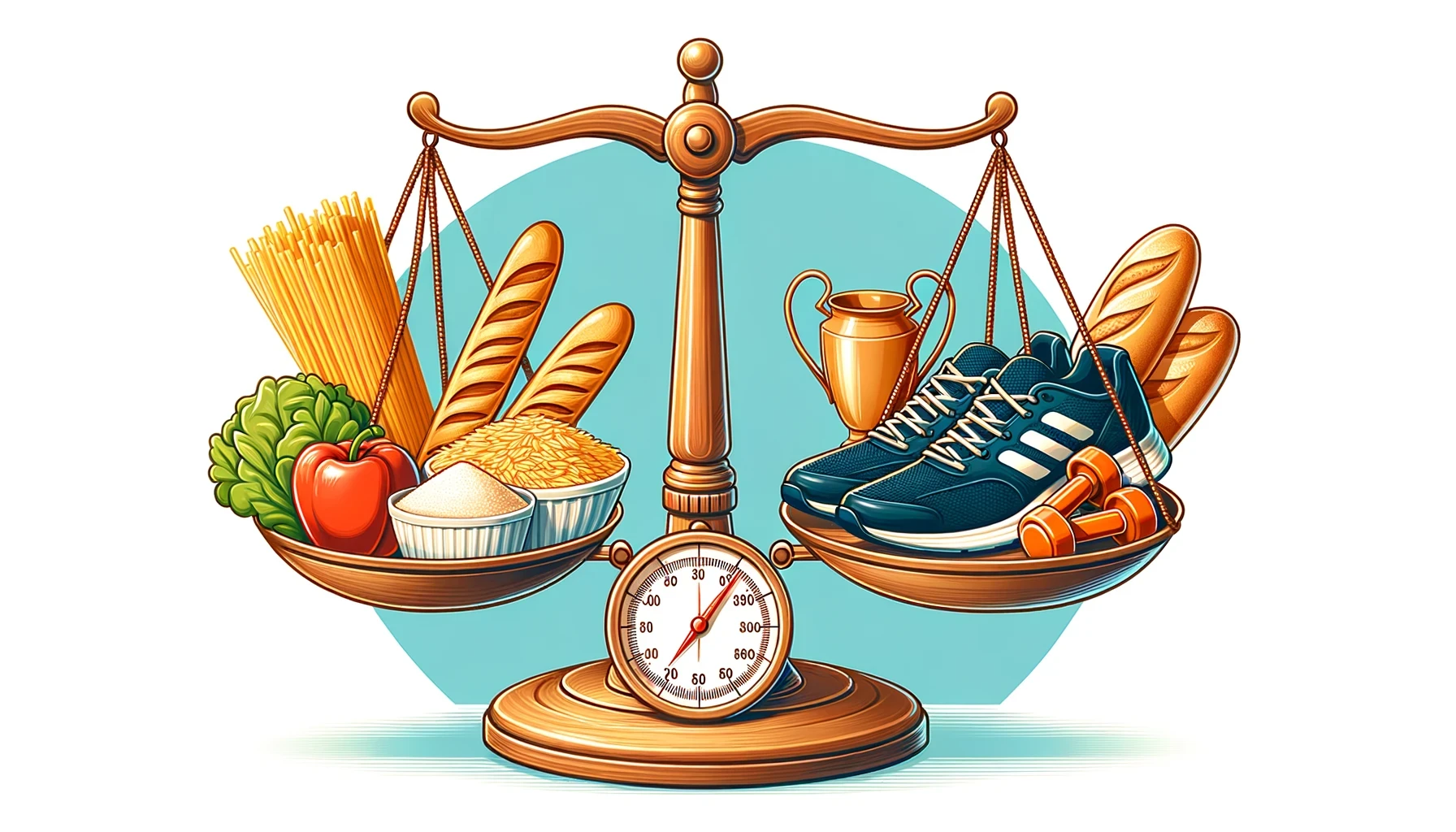In the realm of athletic nutrition, the role of carbohydrates is often highlighted due to its potential in enhancing performance. As an athlete myself, I have experienced the surge of energy carbohydrates can provide. They are often touted as the energy fuel that drives athletic prowess. However, it’s essential to navigate this macronutrient with a balanced perspective.
Numerous studies have pointed out the significance of carbohydrates in sustaining high-intensity performance. They indeed can serve as an optimal energy source for strenuous workouts and competitions. Nonetheless, like any dietary component, carbohydrates should be consumed within a balanced framework to avoid adverse effects on health.
The general dietary guidelines suggest that 45-65% of one’s caloric intake should come from carbohydrates. This guideline, however, may not fit every athlete’s individual needs or circumstances. It’s crucial to tailor your carbohydrate intake based on personal health conditions, athletic goals, and the guidance of healthcare professionals.
While carbohydrates are far from being just empty calories, and play a crucial role in athletic nutrition, overly relying on them or consuming them in excessive amounts can lead to potential issues such as weight gain or metabolic disturbances. It’s vital to balance your carbohydrate intake with other essential macronutrients like proteins and fats to ensure a holistic nutritional approach.
The conversation around carbohydrates shouldn’t just revolve around their potential to boost athletic performance. It’s equally important to address their consumption within a broader nutritional context to promote a balanced and health-conscious approach towards achieving athletic goals. Together, let’s strive for a more informed and holistic understanding of carbohydrates in fueling our athletic endeavors.
The Importance of Carbohydrate Intake for Athletes
As athletes, we push our bodies to the limit, requiring extra energy to fuel our intense training sessions and optimize our performance. One key component of our athletic nutrition is carbohydrate intake. Carbohydrates serve as a vital energy fuel source, providing us with the necessary power to excel in our chosen sports.
During high school, our nutritional needs increase significantly compared to our less active peers. To meet these demands, it is crucial for us to consume more calories, protein, and carbohydrates. Females typically require around 2,200-3,000 calories per day, while males need approximately 3,000-4,000 calories per day. Multisport athletes may even require up to 6,500 calories per day to meet their energy needs. Carbohydrates play a significant role in meeting these requirements and supporting our athletic endeavors.
By prioritizing carbohydrates in our diet, we can fuel our bodies with the essential energy needed for intense workouts and competitions. Carbohydrates are broken down into glucose, which is stored as glycogen in our muscles. This glycogen is then utilized during exercise, providing a quick and efficient source of energy. It is recommended that we consume around 45-65% of our daily caloric intake from carbohydrates to ensure we have enough fuel to power our performances.

The Role of Carbohydrates in Athletic Performance
Carbohydrates not only provide us with energy but also help enhance our athletic performance in various ways. When our glycogen stores are depleted, our energy levels decrease, and fatigue sets in. By optimizing our carbohydrate intake, we can delay the onset of fatigue, allowing us to perform at our best for longer periods.
Carbohydrates also play a crucial role in recovery. After intense training or competition, our muscles are in need of replenishment. Consuming carbohydrates post-activity helps replenish our glycogen stores and kick-starts muscle recovery. Pairing carbohydrates with protein further enhances the recovery process, as protein aids in muscle repair and growth.
| Benefits of Carbohydrate Intake for Athletes | How to Incorporate Carbohydrates into Your Diet |
|---|---|
| Provides essential energy fuel | Include carbohydrate-rich foods in your meals and snacks throughout the day |
| Delays the onset of fatigue | Choose complex carbohydrates, such as whole grains, fruits, and vegetables |
| Aids in muscle recovery and growth | Pair carbohydrates with protein after exercise |
As athletes, we should prioritize carbohydrate intake to support our energy needs, enhance our performance, and aid in our recovery. By working with a sports nutritionist, we can create a personalized plan that ensures we are meeting our specific carbohydrate requirements for optimal athletic success.

The Role of Protein in Athletic Nutrition
When it comes to athletic nutrition, protein plays a critical role in supporting muscle growth, maintenance, and repair. As an athlete, it is important to ensure that you are consuming sufficient protein to meet your body’s needs. The recommended daily protein intake for athletes is typically around 1.0-1.5 grams per kilogram of body weight, although this can vary depending on the type and intensity of your training.
Including lean sources of protein in your diet is essential for optimizing athletic performance. Foods such as lean meats, poultry, fish, dairy products, and plant-based proteins like beans and tofu are excellent choices. These protein-rich foods provide the essential amino acids needed for muscle protein synthesis and recovery.
In addition to helping with muscle repair and growth, protein can also provide you with a feeling of satiety, helping to curb cravings and maintain a healthy weight. It is important to spread your protein intake throughout the day, rather than consuming it all in one meal, to maximize its benefits.
Protein Intake Guidelines for Athletes
It is crucial for athletes to work with a sports nutritionist or a registered dietitian to determine their specific protein needs. These professionals can provide personalized guidance and help create an individualized meal plan to support optimal athletic performance.
| Athlete Type | Recommended Daily Protein Intake (grams per kilogram of body weight) |
|---|---|
| Endurance athletes | 1.2-1.4 grams/kg |
| Strength and power athletes | 1.4-1.7 grams/kg |
| Teen athletes | 1.0-1.5 grams/kg |
These guidelines serve as a starting point, and individual needs may vary. It’s important to listen to your body and make adjustments as necessary. Remember, protein is just one piece of the puzzle when it comes to optimal athletic nutrition. It should be consumed alongside carbohydrates and healthy fats to create a well-balanced diet that supports your overall performance and well-being.
Optimal Nutrition Timing for Athletes

When it comes to athletic performance, timing is everything. The right nutrition can make a significant difference in an athlete’s energy levels, endurance, and recovery. Properly timed meals and snacks can provide the necessary fuel to maximize athletic performance and promote muscle growth and repair. Here are some key considerations for optimal nutrition timing for athletes.
Fueling Before the Event
Prior to a game or competition, athletes should focus on consuming familiar foods that they have tried and tested during training. It’s important to eat a balanced meal containing carbohydrates and protein 3-4 hours before the event. Carbohydrates provide the necessary energy, while protein supports muscle maintenance and repair. This meal should be followed by a smaller, low-fat snack or meal about 60 minutes before the event to top up energy levels right before the competition.
Recovery and Muscle Growth
Post-activity nutrition plays a crucial role in replenishing glycogen stores and promoting muscle recovery and growth. Athletes should aim to consume a combination of protein and carbohydrates within 30 minutes of activity. This can be achieved through options like a protein shake or a balanced meal containing lean sources of protein and carbohydrates. Research suggests that consuming around 25 grams of protein and 50 grams of carbohydrates within this post-activity window can optimize muscle protein synthesis and support recovery.
Individualized Approach
Each athlete’s nutritional needs and preferences may vary, so it’s important to adopt an individualized approach to nutrition timing. Factors such as the duration and intensity of training, body composition goals, and personal preferences should be taken into account when planning meals and snacks. Working with a sports nutritionist can help athletes create a customized nutrition plan that meets their specific needs and maximizes their performance potential.
| Nutrient | Timing |
|---|---|
| Carbohydrates | 3-4 hours before the event |
| Protein and Carbohydrates | Within 30 minutes of activity |
The Crucial Role of Carbohydrates in Athletic Nutrition
As an athlete, I understand the importance of fueling my body with the right nutrients to enhance my performance. One key element that often gets underestimated is carbohydrates. Carbohydrates are the true powerhouse when it comes to providing the energy I need to excel in my sport.
Research consistently shows that carbohydrates are the primary macronutrient for sustaining and enhancing high-intensity performance. In fact, official dietary guidelines recommend that 45-65% of my caloric intake should come from carbohydrates. For hungry athletes like me, prioritizing carbohydrates in our diet is essential to fuel our intense workouts and optimize our athletic performance.
But it’s not just about the quantity of carbohydrates; it’s also about the quality. I make sure to choose complex carbohydrates like whole grains, fruits, and vegetables, as they provide a steady release of energy, keeping me fueled for longer periods of time. Simple carbohydrates, on the other hand, provide quick bursts of energy but can leave me feeling depleted later on.
By incorporating carbohydrates into my athletic nutrition plan, along with balanced protein intake and proper timing of meals, I am able to give my body the fuel it needs to push my limits and achieve my athletic goals. So, fellow athletes, let’s prioritize carbohydrates in our diets and fuel our performance to new heights!
FAQ
Why are carbohydrates important for athletes?
Carbohydrates are the preferred fuel substrate for optimal energy in athletes. They provide the necessary energy for high-intensity performance and enhance overall athletic performance.
How much carbohydrates should athletes consume?
Official dietary guidelines recommend that 45-65% of a person’s caloric intake should come from carbohydrates. Athletes, especially hungry athletes, should prioritize carbohydrates in their diet to fuel their intense workouts and enhance their athletic performance.
What other nutrients are important for athletes?
Protein is another vital nutrient for athletes as it supports muscle growth, maintenance, and repair. Athletes should also consume a balanced diet that includes lean sources of protein, such as lean meats, poultry, fish, dairy products, and plant-based proteins.
When should athletes consume their meals?
Timing is essential when it comes to nutrition for athletes. Before a game or competition, athletes should consume a balanced meal containing carbohydrates and protein 3-4 hours before the event. They should also have a smaller, low-fat meal or snack about 60 minutes before. Post-activity, athletes should consume a combination of protein and carbohydrates to optimize recovery and muscle growth.
How can athletes optimize their performance through nutrition?
By prioritizing carbohydrates in their diet, consuming adequate protein, and following proper nutrition timing, athletes can fuel their bodies, support muscle growth and repair, and enhance their overall athletic performance. Working with a sports nutritionist can help ensure they are meeting their specific dietary needs for maximum performance.
